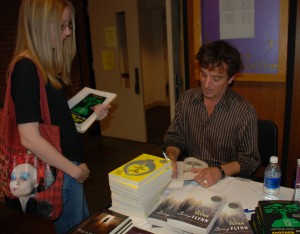“The job of an artist,” said Nick Flynn, “is going into the unknown and coming back out with something to give to people.”

Nick Flynn signing one of his book at the Spring Literary Festival, March 2012 at WCU. Photo: Marysa Burchett
Western Carolina’s 10th Annual Spring Literary Festival ended March 22 with Nick Flynn as the final author to speak. The author gave the audience a very dynamic show with poems, prose, journals and photo slide shows.
Flynn was born in Boston and has been through many hardships. His parents divorced when he was young, and his father was never a part of his life. When Flynn was 22 years old, his mother committed suicide. He worked several types of jobs including at a homeless shelter and writing. While writing about his late mother, he met his homeless father for the first time at the age of 27. The book and movie spawned from these encounters.
“He is just a living example of what a person can go through and how much they can accomplish despite that; in spite of that. You can just tell that he takes his work seriously, even just the basic craft and telling the true story without being jaded,” said sophomore Julie Reis.
Flynn recited excerpts from his book “Another Bullshit Night in Suck City” about his mother, father, memories and encounters through his life. He accompanied the readings with photos of the set of “Being Flynn”. It gave the audience aid while they linked his life to his words to the movie.
His intentions on writing his first memoir was to find each and every one of his mother’s ex-boyfriends and ask them, “How did you meet my mother, and how did you find out she died?” The passage he read including these questions were, “Flawless: How to Rob a Bank.” Flynn revisited his past in order to find his mother and found his father as he truly was.
Flynn continued on by reading some poems from his other book “The Captain Asks for a Show of Hands,” which were made from the redacted statements of the Iraqi Abu Ghraib detainees that were beaten by U.S. soldiers. While reading, he presented a couple of slide shows of paintings that illustrate his redacted poems. Flynn’s depictions and use of words were vulgar, raw, disheartening yet inspiring.
“He is thrown into one of these boxes, for days that turn into weeks, unable to straighten his body, barely able to breathe. Every twenty or thirty minutes a soldier kicks the box, or hits it hard with a club, and it makes his shackled body jump. Around him he can hear the screams and pleadings of his fellow prisoners — those with stomach pains, those with infections, those slowly going mad. Among themselves the Iraqis call these boxes tawabeet aswada, or nash aswada — “black coffins.”” (Excerpt from “The Captain Asks for a Show of Hands”)
This book of redacted testimonies of the Iraqi detainees is turned into poetry. Flynn uses several voices from his past to the detainees so the reader is able to feel the pain that they went through. The stinging reality of the Iraqi war is dissected and pieced together for the reader to understand.
Flynn ended the night with advice for aspiring writers. He used the example of Buddhist practices. There are the three guidelines or practices that a Buddhist takes refuge in: Buddha, Dharma and Sangha. These are called the Three Jewels. They are the same practices a future writer should harbor.
“Your dharma is the texts you read everyday to build off of. Your sangha is the group of people you have around you to help you grow and your Buddha (or meditation) is the action of writing everyday. It is like a three-legged tripod. Without all three, it won’t work,” concluded Flynn.


